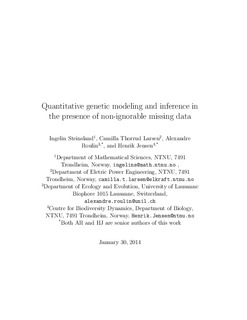Quantitative genetic modeling and inference in the presence of nonignorable missing data
Journal article, Peer reviewed
Accepted version
Permanent lenke
http://hdl.handle.net/11250/2463309Utgivelsesdato
2014Metadata
Vis full innførselSamlinger
- Institutt for biologi [2575]
- Institutt for matematiske fag [2468]
- Publikasjoner fra CRIStin - NTNU [38127]
Sammendrag
Natural selection is typically exerted at some specific life stages. If natural selection takes place before a trait can be measured, using conventional models can cause wrong inference about population parameters. When the missing data process relates to the trait of interest, a valid inference requires explicit modeling of the missing process. We propose a joint modeling approach, a shared parameter model, to account for nonrandom missing data. It consists of an animal model for the phenotypic data and a logistic model for the missing process, linked by the additive genetic effects. A Bayesian approach is taken and inference is made using integrated nested Laplace approximations. From a simulation study we find that wrongly assuming that missing data are missing at random can result in severely biased estimates of additive genetic variance. Using real data from a wild population of Swiss barn owls Tyto alba, our model indicates that the missing individuals would display large black spots; and we conclude that genes affecting this trait are already under selection before it is expressed. Our model is a tool to correctly estimate the magnitude of both natural selection and additive genetic variance.
